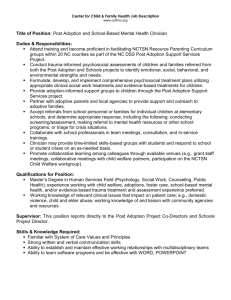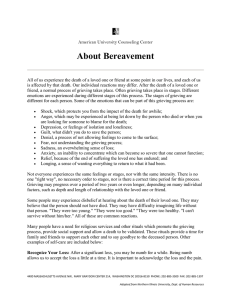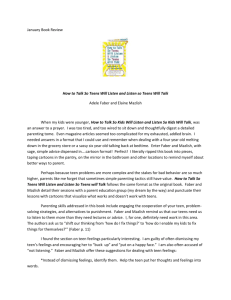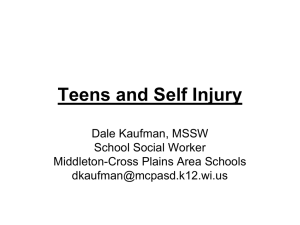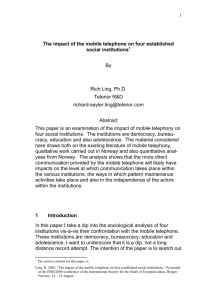Is It Depression or a Normative Stage of
advertisement
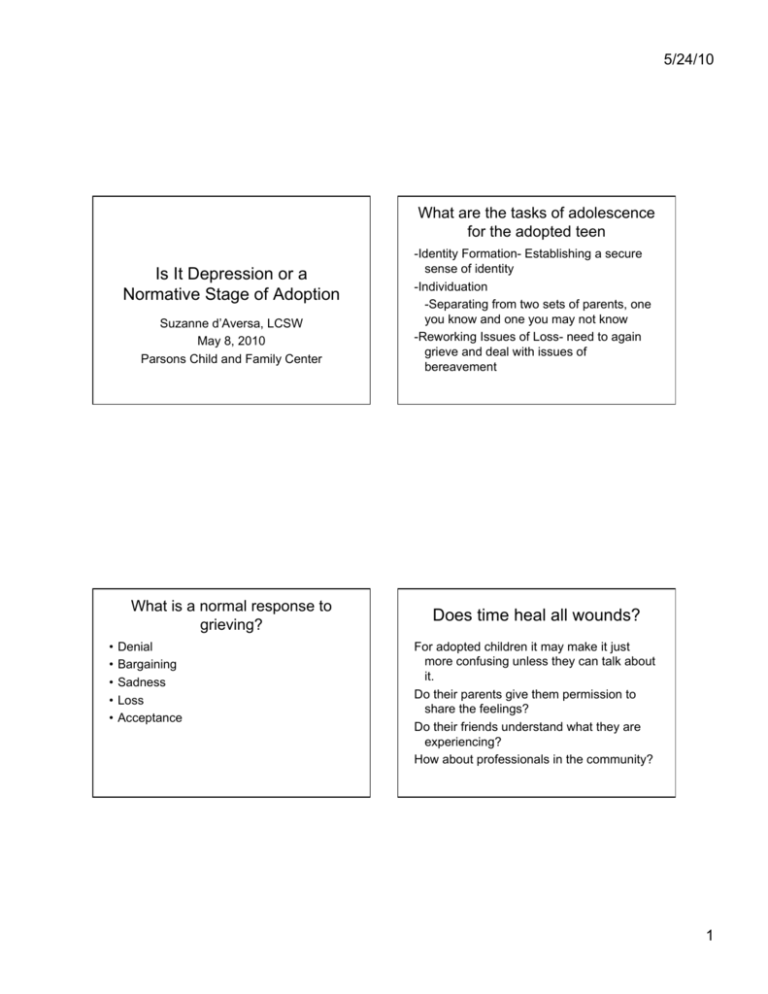
5/24/10 What are the tasks of adolescence for the adopted teen Is It Depression or a Normative Stage of Adoption Suzanne d’Aversa, LCSW May 8, 2010 Parsons Child and Family Center What is a normal response to grieving? • • • • • Denial Bargaining Sadness Loss Acceptance -Identity Formation- Establishing a secure sense of identity -Individuation -Separating from two sets of parents, one you know and one you may not know -Reworking Issues of Loss- need to again grieve and deal with issues of bereavement Does time heal all wounds? For adopted children it may make it just more confusing unless they can talk about it. Do their parents give them permission to share the feelings? Do their friends understand what they are experiencing? How about professionals in the community? 1 5/24/10 Can the birth parents be important without threatening other relationships • An adoptive parents ability to listen to the pain without personalizing it is the most important thing they can do. • Do deal with these issues of loss, they do want the person they have a relationship with to help them. • Be aware of professionals that may try and say your relationship is weaker with your child because they are adopted. If you hear this, go and talk with them privately. • Adolescence may be the first time the teens feel “big” enough to explore these powerful feelings • The loss whether remembered or not may trigger a stronger emotional response than they are used to having. The triggers may be more reflexive and responsive to what is going on without even being able to identify where it comes from • This is the time the adopted child will begin to really try and sort out what it means that their birth parent is not with them. What does it say about them as people. What does it say about the person who they are not with, and how is this connected? • Adopted teens may begin to perseverate on the thoughts of loss which they may not verbalize and may not feel safe to verbalize. Can their adopted parents, siblings, family members handle hearing their feelings? 2 5/24/10 What often triggers the normative emotions? • • • • Loss of a significant person in their life Loss of a boyfriend or girlfriend Getting cut from a sports team Testing the limits and having it not turn out so well • Thinking about search and being afraid to start and afraid not to start • Searching and finding something they didn’t expect • Seeing a birth family member unexpectedly • Sorting out who I am comes in the context of a relationship with someone, it can not be done alone in a vaccuum Dealing with Professionals in the Community • Sometimes the grieving at this time is intense and mirrors a major depression or is acted out in suicidal thoughts propelling the parents to seek mental health professionals. • Seeking this help is often appropriate and necessary • Responding to the feelings as a normative response to the loss inherent in adoption will guide the treatment to look at the resilency and resources available to the teen (Even if the behavior may be seen as less than normative- the response is in some way adaptive to a situation they were unprepared to handle. Professionals need to be familiar with the issues of adoption and know that some level of rejection by the teen of adoptive parents is normal and to be expected Problems are not always a sign of a bad fit Professionals can be referred to post adoption resources in the community to get information, and parents may need to be the ones to refer them 3 5/24/10 Finding Resiliency • Adopted teens have many issues to grapple with and added layers. • Each developmental stage may feel more intense because they need to deal with an added loss • However, there is hope in seeing that this grieving is something that is exactly what they need to do. They are on track when it happens. Not that grieving is pleasant, and certainly parents would spare their children if they could, but seeing it as normative helps to build in strength Tips for Parents from Adopted Teens • Don’t give up. How hard we push away is how much we are hurting and scared • Ask us questions, but don’t be surprised if we tell you we don’t want to talk about it. Knowing we can, makes a lot of difference • We are sorry that we can’t tell you until we are much older how much it has meant to us. • Get me help and a place to talk, even when I say I don’t want it. But remember it may come in different ways. Maybe I just want someone to help you listen to me, not make me change • Know that you are making a difference in my life every day you stay in it, no matter what I say 4 5/24/10 • Every Child needs a Forever Family • Adoption Makes a Huge Difference in the Life of Children 5






